Conclusions from the Aporta Meeting 2017
Fecha de la noticia: 08-11-2017

Here we review the main conclusions taken from the 7th Aporta Meeting, which took place on October 24 at the headquarters of SESIAD and where national and international experts from the open data sector met.
With the title ´The value of data in the global ecosystem´, this year’s edition focused on analysing the benefit of opening up data for the economy, society, or the research field. Also, the evolution of the international open data roadmap was reviewed; and new technology linked to data was discussed, such as the internet of things, natural language processing and big data.
The Director of Red.es, José Manuel Leceta, who opened the meeting, referred to data as the catalyst for the 21st century and the body that aims to be “a meeting point for initiatives of the sector”. Equally, the willingness to continue expanding the catalogue from datos.gob.es and to adopt what is stated by the International Charter for Open Data, as well as “other initiatives that may continue to generate value, such as carrying out studies or sectorial meetings of this type”.
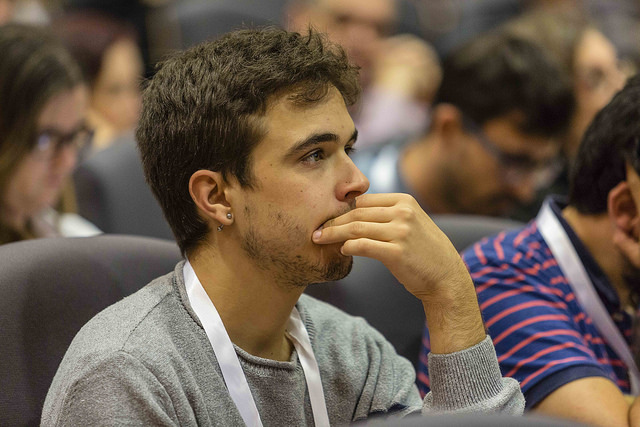
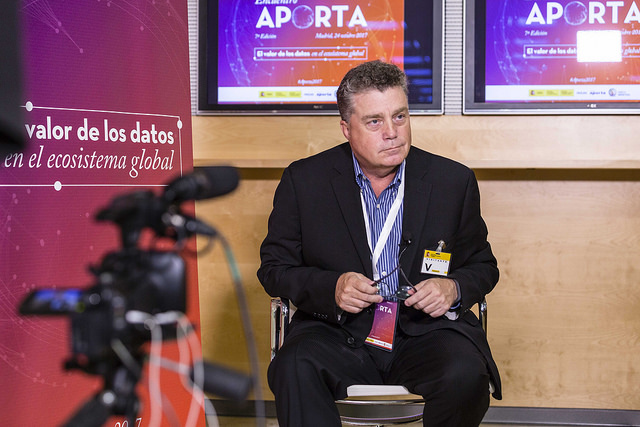
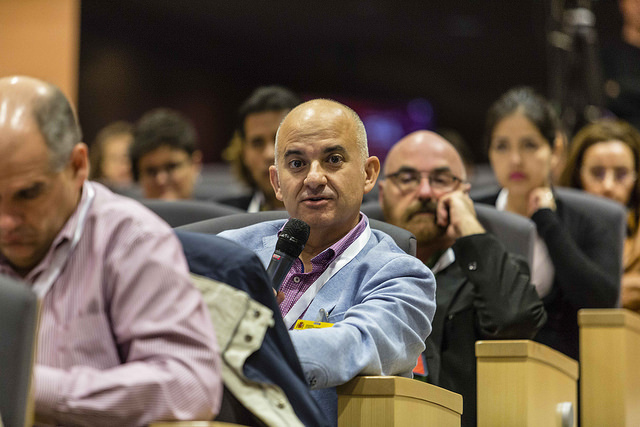
The first of the three blocks which the meeting was structured around analysed the value of data, which the project manager of the European Data Portal, Wendy Carrara, quantifies as 325 billion euros in Europe, with a return of 14 euros for every euro invested. In terms of its use, she believes that the true value lies in the combination of different types of data and sources, “there is no data that is more important than the other”, and encourages publishing everything possible so that third parties can decide how to capitalise this volume.
For his part, the president of the Multisectorial Association of Information (ASEDIE), Dionisio Torre, shared data from the Spanish infomediary sector, which has a turnover of almost 1.705 billion euros, especially related to geographical information. Also as the general director of Axesor, Torre commented on different data exploitation models, such as the development of tools for clients risk management, that help to reduce losses due to non-payments and to decrease management times. Other examples shown included indicators for valuing housing, local shops and estates, or linked to the consumption of different products; analysing market niches, with algorithms that locate areas where the demand of products and services is high; calculating commercial routes; analysing the overlapping of areas of influence; or establishing relations between those who can help us to discover business networks.
The discussion also included participation from the executive director of the Latin American Open Data Initiative (ILDA), Fabrizio Scrollini, who wanted to highlight the social value of data, which he sees as “living infrastructures, which have a cost that does not always give an immediate return, but does have social benefits. Data can help to combat, for example, domestic violence, which is important”, and he encouraged public administrations to think about the social value of data, proposing key issues such as what social problem am I trying to solve? Or what is my hypothesis for how to add or create value by using data?
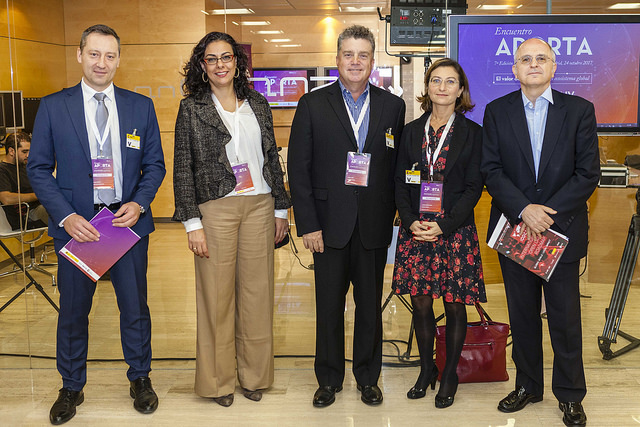
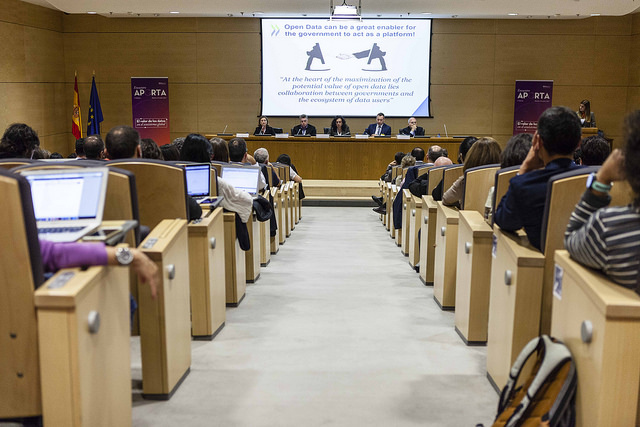
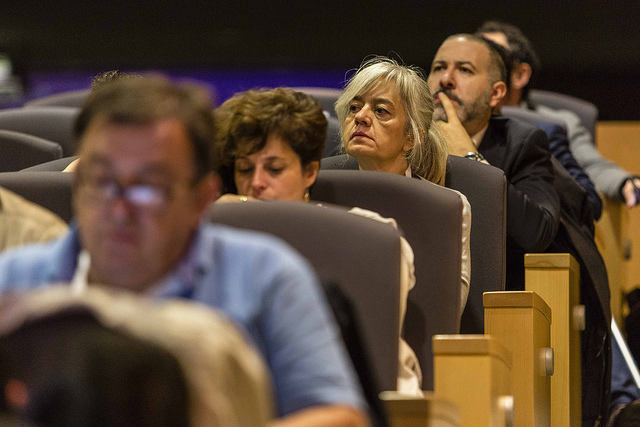
The permanent professor from the Library science and Documentation of UC3M department, Eva María Méndez, shared her vision from a research perspective, asking how much data from researchers end up in the EU portal and how many create airtight research portals. Also, she showed her concern over what she considers a gap between research data and data to research, highlighting that the European Commission is preparing an initiative to re-use data for administration and those finances with public funding, that helps both communities to converge
The second of the blocks, mostly made up of international experts, reviewed the advances in the road map, after the 4th International Open Data Conference was held last year in Madrid. Stephen Walker, of the Open Data for Development (OD4D), gave an overview of how the movement of open data has evolved, demonstrating the need to further analyse the impact achieved in the last year, to highlight “what has been done up until now and how has it been achieved”. This way, he numbered seven areas of work identified, which included searching for greater political commitment, especially in countries that before were leaders but are now stagnating or even decreasing in their push on open data policies; revising standards; capacity building in terms of leaders who help to educate about data culture; the effort of collaboration networks; approaching specific problems; decision-making and how to use data to support the sustainable development agenda.
For his part, Szymon Lewandowski, Legal/Policy Officer of the European Commission, called for specific regulation and funding models to help Europe reach the 4% GDP growth by 2020. Lewandowski also shared figures from the European Open Data Portal which demonstrate the sound progress of the sector’s economy, “there is a lot of potential in the data and reasons to undertake initiatives in European policy”. The speaker also highlighted the Commission’s commitment for 2018 through the concept “Data package”, which encompasses a diverse group of data, such as Business Data, Government Data and Scientific Data, which will help to stop thinking about open data as an independent group of data, so that it can be integrated and attain value in data across different sectors.
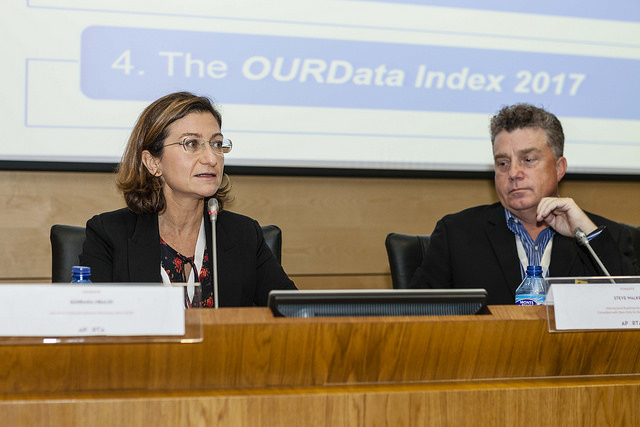 The head of Open Data for the Organisation for Economic Co-operation and Development (OECD), Bárbara Ubaldi, praised the work done in Spain which had allowed it to reach sixth position in the Open-Useful-Reusable data Index (OUR Data Index). For the speaker, the re-use of data is essential as “it has a high opportunity cost that is shown in the form of economic interest, efficiency of the public sector and social value, to empower citizens”. Also, she believes that “data can increase its value if it is standardised” and she demonstrates that “the aim of the Charter is to build a common framework between countries freely, to avoid the digital divide”. Also, to promote co-creation, the number of datasets has to increase but, also, these have to be made accessible. Salvador Soriano, from the Secretary of State for Information Society and Digital Agenda (SESIAD), agreed that this data is positive for Spain, “those who have contributed to the Aporta Initiative and the National Data Catalogue of Datos.gob, which is fuelled by regional data (48%), local governments (28%) and the General State Administration (24%), mainly INE and CSIC, some 16,000 datasets in total”. Salvador recognised that, “we have to measure the economical -because it is easy-” but also we have to find out “how it impacts on society”. Finally, he encouraged those attending to “make the data economy a major asset for the country”.
The head of Open Data for the Organisation for Economic Co-operation and Development (OECD), Bárbara Ubaldi, praised the work done in Spain which had allowed it to reach sixth position in the Open-Useful-Reusable data Index (OUR Data Index). For the speaker, the re-use of data is essential as “it has a high opportunity cost that is shown in the form of economic interest, efficiency of the public sector and social value, to empower citizens”. Also, she believes that “data can increase its value if it is standardised” and she demonstrates that “the aim of the Charter is to build a common framework between countries freely, to avoid the digital divide”. Also, to promote co-creation, the number of datasets has to increase but, also, these have to be made accessible. Salvador Soriano, from the Secretary of State for Information Society and Digital Agenda (SESIAD), agreed that this data is positive for Spain, “those who have contributed to the Aporta Initiative and the National Data Catalogue of Datos.gob, which is fuelled by regional data (48%), local governments (28%) and the General State Administration (24%), mainly INE and CSIC, some 16,000 datasets in total”. Salvador recognised that, “we have to measure the economical -because it is easy-” but also we have to find out “how it impacts on society”. Finally, he encouraged those attending to “make the data economy a major asset for the country”.
The final block was dedicated to new technology used for open data. For the head of Territorial Analysis at BBVA Data & Analytics, Juan Murillo, it is clear that we all leave a digital footprint, therefore, it is important to work openly so that data can be re-used and, above all, analysed. Also he wanted to translate two clear messages. Encouraging management based on proof and the ability to measure everything through different sources in order to have a global vision.
From a business perspective, the Head of Innovation&Discovery at AURA/CDO from Telefónica, Antonio Gúzman, pointed to security as an inherent factor in opening and exploiting data. Also, he referred to four fundamental factors in treating data: volume, variety, speed and veracity, emphasizing the importance of the final factor. So that companies can make better decisions based on reliable data analysis, it is necessary to provide them with “infrastructure that lowers the access and exploitation of information”.
Other speakers, the coordinator for the Area of Technology for the Office of SESIAD, David Pérez, focused on natural language technologies, calling for more text corpora, abstract and taxonomies to enable the training of these multilingual classification systems. For this, he called for common repositories, although he did highlight the immense richness of current resources, such as those provided by public administrations. However, he recognised that semantic resources are very expensive and, therefore, he believes it is necessary to reach international agreements and common projects. In the third discussion, the executive partner of the consultant Gartner, Javier González Marcos, also participated and shared a very positive perspective on the sector, which he said was “in vogue”. He also wanted to make some recommendations so that all bodies and companies who want to undertake projects to open up their data, such as having a scalable budget, monitoring advances that arise in the platforms and technology, controlling costs, security and strategy, and not to rely solely on our infrastructure and searching for cloud solutions.
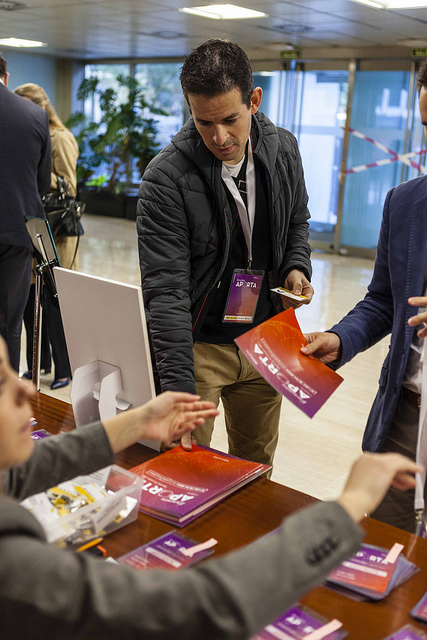
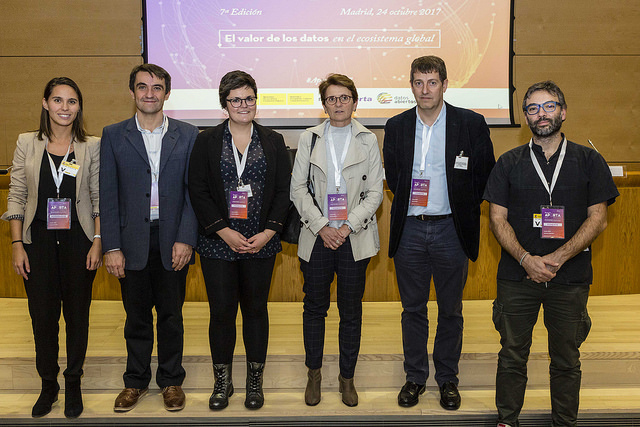
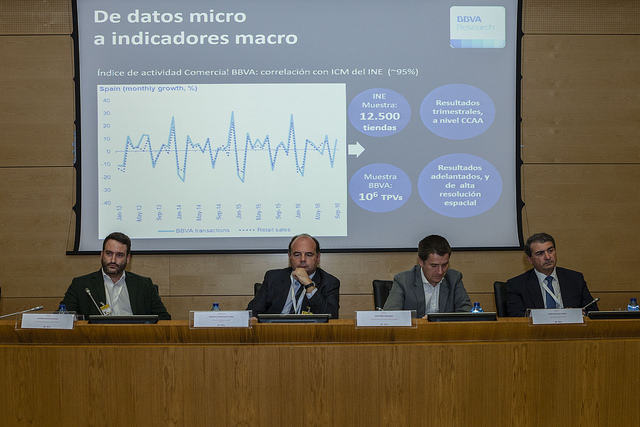
The final part of the event was dedicated to the presentation of the conclusions drawn from the previous events to Aporta 2017, which took place in Madrid during the whole month of October. Before closing, the awards were handed to the winners of the Aporta Challenge 2017: The value of data for Government and the Aporta Awards 2017, which recognise the best projects on the re-use of data and apps designed to improve the efficiency of public administrations in Spain.
Galery of the event pics











